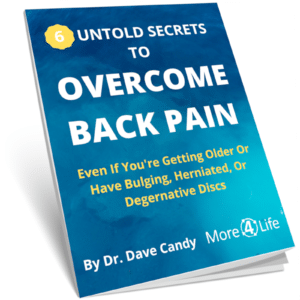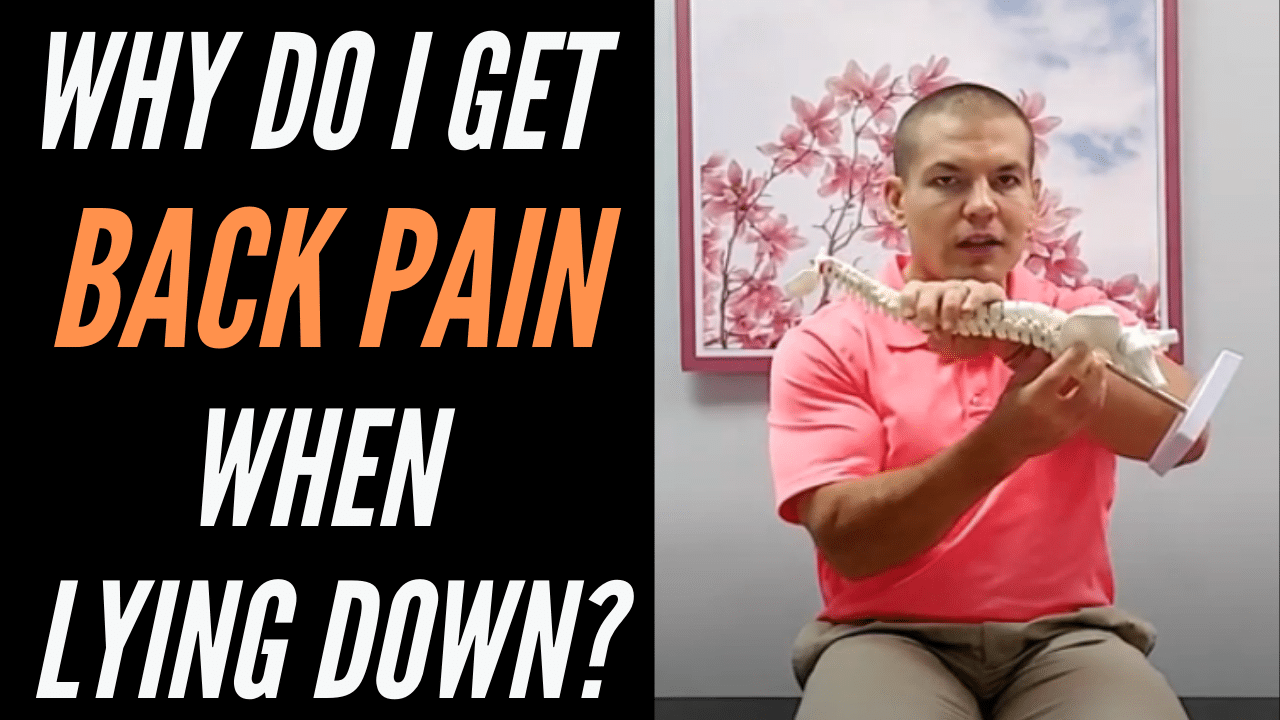Do You Get Lower Back Pain When Lying Down?
If you've ever wondered, "Why does my back hurt when I lay down flat?", watch the video to learn how to relieve lower back pain when lying down so that you can sleep comfortably at night.

Why Does My Back Hurt When I Lay Down Flat?
I frequently get this question from clients who suffer from lower back pain. After being on their feet all day, they just want to lie down and relax.
However, sometimes it's difficult for them to do so because their lower back hurts even they lay down flat.
Truth be told, it's fairly common for people to have back pain when lying down, or when sleeping at night, even if their pain isn't that bad during the day.
Now, you'd think that lying down would be the most comfortable position.
After all, lying down DOES unload your spine so that gravity isn't pushing down through it. Furthermore, when you lay down flat, your lower back is supported.
Or is it?
If you're over 40 years of age, as are most of our clients here at More 4 Life, having too much arch in your lower back can make your back hurt when you lay down.
When there's too much arch in your lower back, the facet joints (see picture below) get pressed together and can start to irritate the joint surfaces.
Stiff Back Extensor Muscles Can Be A Cause Of Lower Back Pain When Lying Down
In addition, when there's too much arch in the lower back, back extensor muscles (erector spinae muscles) get short and stiff, kind of like the bowstring on a bow-and-arrow.
This makes it harder for them to stretch when lying down.
That's why you might feel ok for a few minutes, but after lying down for awhile, your lower back starts to hurt as gravity tries to flatten your spine against the bed.
However, your stiff lower back muscles won't allow your spine to lay flat on the bed. Therefore, the tension in your lower back muscles starts to cause back pain when lying down.
Here's How To Stretch Stiff Lower Back Extensor Muscles:
The "Child's pose" stretch as it's caused in Yoga, or sometimes called the "prayer stretch" is a great exercise for stiff lower back extensors.
Tight Hip Flexors Can Cause Lower Back Pain When Lying Down Too
Your hip flexors, or more particularly psoas muscle, attaches to the front side of your spine and can pull your lower back into too much arch, thus causing lower back pain as your legs attempt to fall flat on the bed if you're lying on your back.
Doing a psoas release can help relax your hip flexors so that you legs can lay flat on the bed. However, it also helps to stretch your hip flexors.
Click here to learn 4 Different Hip Flexor Stretches To Relieve Lower Back Pain.
Sleeping Position Can Affect Lower Back Pain When Lying Down
What Should I Do If My Back Hurts Hurts When I Lay Down Flat My Back?
-
Put a pillow (or maybe even 2, 3, or 4 pillows under your knees) in order to put your hip flexor muscles on slack and allow your lower back to flatten into the table.
-
If you need more than a few pillows, a bolster pillow under your knees can help.
What Should I Do If My Back Hurts Hurts When I Lay Down On My Side?
-
-
Put a pillow between your knees.
-
Bend your hips and knees enough that they allow your lower back to be in a neutral position
-
The pillow also keeps your pelvis in a neutral alignment, and keep it from twisting or rotating when lying down on your side.
-
Need Help For Lower Back Pain?
Click the button below to request a FREE Back Pain Consultation...
Why Your Lower Back Muscles Get Stiff When Lying Down
As I mentioned above, some people with back pain feel OK during the day when moving around, and they only get lower back pain when lying in bed at night.
Why is this?
There are a few reasons why your back might hurt worse when you lay down at night:
During the day, when you're moving around, your heart is circulating blood to the muscles, nerves, and discs in your back providing the nutrients and oxygen they need to stay healthy. Additionally, your joints and muscles are moving and changing positions frequently.
However, when you lay down at night, your back doesn't get as much blood flow and oxygen. Your joints and muscles are staying in the same position, thus allowing your muscles to stiffen up. Your joint surfaces have a static pressure on them.
Furthermore, the discs in your lower back have a poor blood supply under normal circumstances, so they rely on movement to get the nutrients and oxygen that they need.
Learn more about that in the post "Can Herniated Discs Heal By Themselves Without Surgery?"
Why Does Low Oxygen Cause Back Pain?
If you recall all the way back to high school or college biology class, human cells use oxygen to turn food into energy.
Without giving you unpleasant flashbacks by explaining the full process of glyocolysis and oxidative phosphorylation, the simple explanations is that you CAN create energy without oxygen, but it's much less efficient to do so and it creates a bi-product of lactic acid - the same chemical that causes you to "feel the burn" in your muscles after a hard workout.
Now, if you're trying to relax, the last thing you want is to "feel the burn" in your back muscles.
So how can you keep your lower back muscles from stiffening up when lying down?
-
Be active during the day. Regular physical activity makes changes in the cell that improve blood flow at rest, as well as make your muscles more efficient at producing energy.
-
Don't smoke. Smoking substantially reduces how much oxygen is available to ALL of your body's cells, not just your lower back.
-
Stretch before bedtime. Particularly the lower back and hip flexor muscles.
Need Stretches For Lower Back Pain?
Check out these posts:
7 Chair Yoga Poses For Neck Pain & Back Pain
Or you can Request An Appointment with one of our Specialist Physical Therapists
What Else Can I Do If My Lower Back Hurts When I Lay Down At Night?
It's no myth that you brain has A LOT to do with how much pain you experience.
When you're busy during the day your brain is focused on other things, even if joints, discs, and/or muscle in your back are in less-than-optimal health.
However, when you lie down at night in a quite bedroom and your brain doesn't have any other "distractions" it starts to focus more on the signals coming from your muscle, and it may even start to worry about those signals.
"What do they mean?"
"Are they harmful?"
"Is my back pain going to get worse?"
"Am I going to have trouble sleeping again tonight?"
Depending on how long you've been dealing with back pain, how many other stressful things are happening in your life, or if you just naturally tend to worry about things, you might even start having thoughts like:
"How long is the pain going to last?" -or-
"Is my back ever going to stop hurting, or am I just going to have to deal with it for the rest of my life?" -or-
"Am I going to need back surgery?"
None of these thoughts are helpful for you getting a good night's sleep, and in fact:
There a lot of research showing that the more you worry about back pain, the more it hurts.
This can become a viscous cycle:
- The more your back hurts the more you worry, and
- The more you worry, the more your back hurts.
So How Do You Break The Pain-Worry Cycle?
-
You can try these 5 mindfulness strategies
-
You can download our Free Back Pain Guide, which has tips to help you sleep more comfortably, free mindfulness resources, plus other tips.
-
Try Prosper Wellness CBD.
Prosper Wellness Full-Spectrum CBD is great fore relieving anxiety, reducing pain, and helping sleep.
Need More Help For Lower Back Pain?
Click the button below to request an appointment with a specialist




